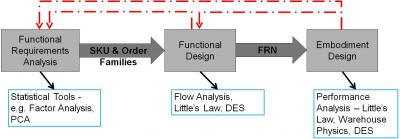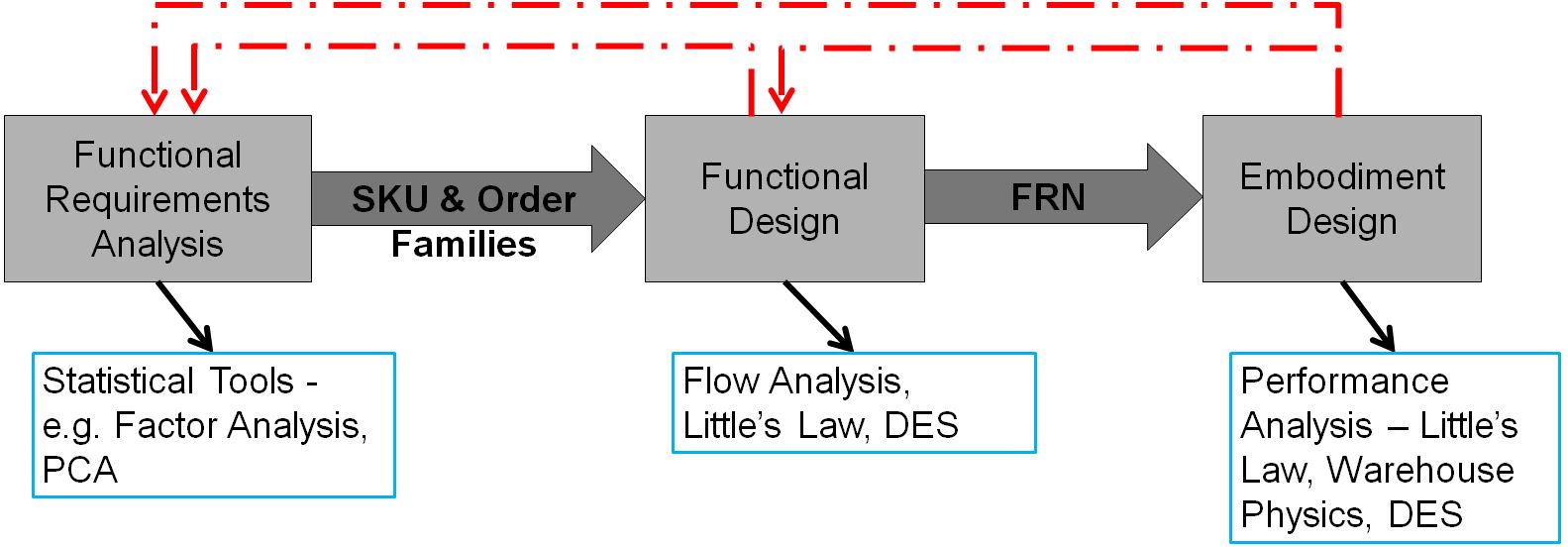While there is a very rich IE/OR/MS literature on DELS analysis problems, methods and tools, there is limited research on DELS design problems. Moreover, while other engineering disciplines have well-integrated tool chains for both specifying artifact design and providing analysis to support design decisions, there are very few such tools in the IE/OR/MS disciplines.
Design research in the Keck VFL blends traditional engineering design theory with an emerging value-driven design philosophy, and tests these ideas with state-of-the-art computational implementations.
Traditional engineering design theory advocates for a multi-phased design workflow: first required functions are identified, then functions are organized into an architecture, and finally the elements of the architecture are given embodiment by selecting, sizing and configuring appropriate technologies. Keck VFL researchers have explored the adaptation of this workflow to the design of warehouses. Elaboration to other DELS domains is an open opportunity.
In Value-driven design (VDD), all design decisions should aim to maximize the value of the designed artifact. Decision Theory asserts that this is only possible if there is a single value function. There are many open questions regarding VDD for DELS. For example, "What constitutes a valid and practical value function?" "How should the design decisions be organized and structured?" "How can the design space be most effectively searched?" The Keck VFL has active research addressing all three questions.
Perhaps one of the most difficult questions in design is "How can the structural and behavioral aspects of a design reflect the control decisions that will be made in real-time?" Answering this question is made difficult by the lack of a canonical model of control for DELS, so this also is a focus of Keck VFL research.
Related Publications
Conference Papers
- ViewSprock, Timothy, and Leon F. McGinnis. "A simulation optimization framework for discrete event logistics systems (DELS)." Proceedings of the 2015 Winter Simulation Conference. IEEE Press, 2015.
- Sprock, Timothy, and Leon F. McGinnis. "A Conceptual Model for Operational Control in Smart Manufacturing Systems." IFAC-PapersOnLine 48.3 (2015): 1865-1869.
- Sprock, Timothy, and Leon F. McGinnis. "Analysis of Functional Architectures for Discrete Event Logistics Systems (DELS)." Procedia Computer Science 44 (2015): 517-526.
- View PosterMcGinnis, Leon, and Timothy Sprock. 2014. "Integrating Analysis Into A Warehouse Design Workflow." 13th International Material Handling Research Colloquium - 2014. Material Handling Industry of America.
- Goetschalckx, Marc, and Leon McGinnis. "Modeling-based design of strategic supply chain networks for aircraft manufacturing." Procedia Computer Science 16 (2013): 611-620.
- ViewWerner, S., Schmidt, A., and L. McGinnis (2013), “Integrating Warehouse Design Models and Warehouse Analysis Models Using ModelCenter,” ISERC 2013, San Juan, Puerto Rico.
Journal Articles
- Peak, Russell, Chris Paredis, Leon McGinnis, Sanford Friedenthal, Roger Burkhart, ” Integrating System Design with Simulation and Analysis Using SysML,” INCOSE Insight Special Edition on MBSE, vol 12, issue 4, December, 2009, 40-43.






